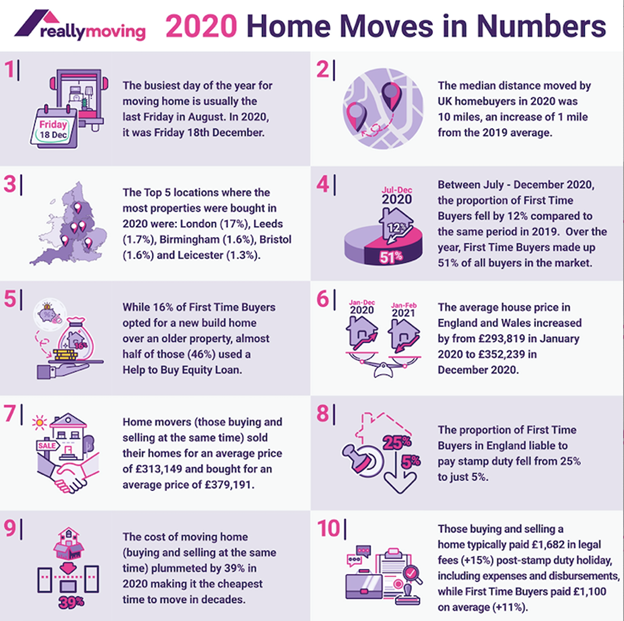2020 Home Moves in Numbers: Last Friday before Christmas was the busiest day for home-movers
Home moves comparison site reallymoving has revealed ten statistics that together tell the story of UK home movers during 2020, an extraordinary year that confounded most expectations in terms of housing market activity and price growth.
The data is based on 910,000 quotes generated on the site throughout the year.
Find out who moved and when, how far they went and what it all cost:
- The busiest day of the year for moving home is usually the last Friday in August, but in 2020 it was Friday 18th December, the last Friday before Christmas. Exceptional demand from buyers taking advantage of the stamp duty holiday drove a surge in activity in the latter part of the year, combined with the completion of moves that had been delayed due to lockdown. In fact, every Friday in December apart from Christmas Day (4th, 11th and 18th December) were all among the top 10 busiest days to move in 2020 for the first time.
- The median distance moved by UK homebuyers in 2020 was 10 miles, an increase of 1 mile from the 2019 average. While much has been made of an urban to rural exodus, in fact the general trend was for movement to less densely populated locations within urban areas, for example, to the outskirts of the towns and cities where people already live, rather than to rural villages and hamlets.
- The Top 5 locations where the most properties were bought in 2020 were: London (13.7%), Leeds (1.7%), Birmingham (1.6%), Bristol (1.6%) and Leicester (1.3%). By region, the South East of England saw the most home mover activity.
- Between July and December 2020, the proportion of First Time Buyers in the market fell by 12% compared to the same period last year, as the post-lockdown boom was driven by equity-rich homeowners higher up the ladder who benefited the most from the stamp duty holiday. Over the year, First Time Buyers made up 51% of all buyers in the market, compared to 56% in 2019.
- While 16% of First Time Buyers opted for a new build home over an older property, almost half of those (46%) used a Help to Buy Equity Loan enabling them to buy with a deposit of just 5%.
- The average house price in England and Wales increased by from £293,819 in January 2020 to £352,239 in December 2020, as buyer activity surged post-lockdown. There is already evidence of this rapid price inflation beginning to reverse, with the reallymoving House Price Forecast predicting prices will fall by 1.2% in January and 2.5% in February 2021, based on deals already agreed.
- Home movers (those buying and selling at the same time) sold their homes for an average price of £313,149 and bought for an average price of £379,191. First Time Buyers paid an average price of £262,180 for their first home.
- The proportion of First Time Buyers in England liable to pay stamp duty fell from 25% to just 5%, following the announcement of a stamp duty holiday from 8th July 2020. Nine out of ten (91%) transactions by all homebuyers, including FTBs, have avoided the tax since July, prompting a surge in market activity and prices.
- The cost of moving home (buying and selling at the same time) plummeted by 39% in 2020 from an average of £10,911 before the stamp duty holiday came into effect to £6,669 after, making 2020 the cheapest time to move in decades.
- Certain costs such as legal fees rose however, as a consequence of being directly tied to rising house prices. Those buying and selling a home typically paid £1,682 in legal fees (+15%) post-stamp duty holiday, including expenses and disbursements, while First Time Buyers paid £1,100 on average (+11%).
CEO Rob Houghton says:
“The property market took us on a rollercoaster in 2020, from shock and despair when thousands of home movers were forced to press pause back in March, to the extraordinary resurgence in demand that began in the early summer and continued right through to the end of the year. Never before has the Friday before Christmas been the busiest day for home moves!
“Most concerning however, has been the decline in the proportion of First Time Buyers in the market. They largely didn’t benefit from the stamp duty holiday and faced huge challenges securing finance as higher loan-to-value mortgages disappeared overnight and several high street lenders banned gifted deposits. Yet there are reasons to be optimistic that 2021 could see a reversal in fortunes for First Time Buyers as lenders return to the market, competition for homes is reduced and price inflation readjusts downwards. Reallymoving is on a mission over the coming year to help homebuyers upskill with a series of live webinars and content designed to help inform and educate about the process, ensuring buyers have everything they need to navigate a successful home purchase.”
Kindly shared by reallymoving.com
Main article photo courtesy of Pixabay

















